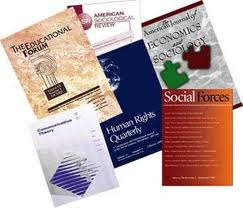- In academic journals there is a list of editorial board members at the beginning
- The articles include sourcing, such as footnotes, endnotes, and bibliographies
- The papers are often illustrated with charts and graphs
- The authors are NEVER anonymous
- The language is very formal: "sensational, highly emotive language is almost never used"
- Most specialize in original research
So, okay, these students are captive to the scholarly journal arena, and university libraries include hefty subscription fees in their budgets as a matter of course. But is this system coming to an end? Have internet search engines such as google guaranteed the demise of these publications in their present form?
PRO:
- Reliable scholarship
- Junk is more likely to be rejected
- Internet data is easy to obtain, but the recipient has to do all his or her assessment, while with scholarly journals the assessment has already been done
- The current journal system employs people with high level filtering expertise, and no search engine can match that
- It allows significant advances to be seen more easily
- "Saner content than a crackpot with a webpage"
CON:
- Anonymity of reviewers cannot be guaranteed when there are only a few experts in the field
- Vulnerability to academic rivalry
- Immense time-lag between submission and publication: one author commented that by the time his technology-related paper was printed it was obsolete and not worth reading
- Despite the peer review system idiotic and plagiarized material has been published
- It panders to intellectual elitism
- Reviewers can be emotionally biased
- Most papers are work in progress, and not a complete understanding
- Because of high charges "these publishing bodies are actually slowing down the advancement of mankind!"

2 comments:
Clinical journals,medical journals,lifescience journals,pharma journals,chemistry journals,engineering journals,management journals,manuscript submission A to Z Journals
I just stumbled upon your blog and wanted to say that I have really enjoyed reading your blog posts. Any way I’ll be subscribing to your feed and I hope you post again soon.
Academic Publishers
Journal Publication
Academic Journals
Art Journal
International Journal Of Research
Post a Comment